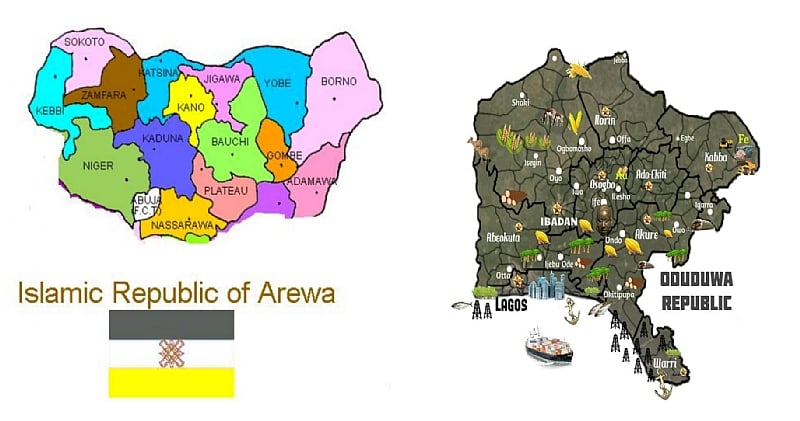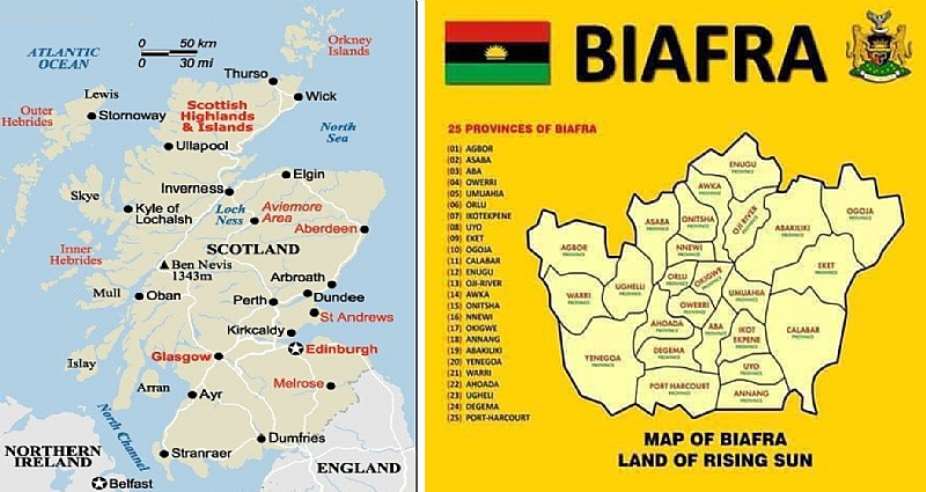Sometimes, it pays to know what is happening in other climes, especially in those countries we Africans always accuse of being in the way of our progress. Indeed, not many Nigerians know that Britain is very much in the same situation that Nigeria finds itself. The only difference, and that is a major one, is that British politics and level of democratic governance are much more advanced than that of Nigeria which is benign military rule masquerading as democracy.
Only eight years ago, in 2014 there was a referendum to determine whether Scotland should break away from the United Kingdom to become Europe’s newest nation state. Surprisingly, the Scots voted by 55% to 45% to stay within the 300 year-old union with England and Wales. Not many would expect that to happen in Nigeria if there was a referendum today. But the possibility cannot be ruled out by any stretch of the imagination. The only problem is that the Federal government is afraid of conducting a plebiscite for whatever reason.
Yet, in Nigeria today, many Northerners from what can be regarded as their middle class want out. The Easterners, especially those of them in the business and civil service cadre want out. Most of the Westerners, led by some of their eminent professors, want out. So do the South-South and the Middle-Belt indigenes. They all want to be liberated from what they mostly see as an unholy union of ethnic nationalities.
The only people who insist on keeping Nigeria ‘’one’’ are those who benefit from its disorderliness, who create ghost workers, fix their salaries and earn the money in addition to their monthly wages, who have access to public funds that they swindle in millions of pounds into their foreign bank accounts, who have oil blocks and earn millions of dollars from them every day, who import oil into a country that ranks number 7 globally in oil production because they are entitled to10% of the contract value in addition to their regular salaries. But somehow, except for local variations, almost the same scenario is playing itself out in the United Kingdom, the country many Nigerians say lumped the various incompatible ethnic groups together for their own selfish economic aggrandizement.
In the case of Scotland, the separatists gathered in strength and numbers. They became key political power brokers by winning most of Scotland’s seats in the UK Parliament. And they are now laying the ground for another vote. The government in London has refused to allow one, yet the push for an independent Scotland shows no sign of going away any time soon.

Scotland and England united to form Great Britain in 1707, but the two nations retain a lot of cultural and political differences. With about 5.5 million people, Scotland makes up about 8% of the UK’s population and its economy. Many Scots see rule from London as a fundamental lack of self-determination. The distinctions go much deeper though: Scotland has its own legal and education systems, soccer league and bank notes. The Scottish National Party, which is spearheading the independence drive, also wants to remove Britain’s nuclear weapons from a deep sea loch in western Scotland.
In pursuance of its motivation, in October 2022, the UK Supreme Court is expected to rule on whether a referendum proposed in new legislation is legal. 19 October 2023 is the date proposed for another independence referendum by the SNP and January 2025 is the last possible date for the next UK general election when the Scottish National Party could form part of a new government in return for a consideration of a referendum.
The SNP is a formidable electoral organization that won 48 of Scotland’s 59 seats at the last 20019 general election. The results pointed to a possible win for the independence campaign in the run-up to the 2014 referendum but warnings about the economic impact of a split and the UK government’s refusal to allow an independent Scotland to continue using the British pound as its currency helped swing the electorate. In the eight years after the vote, polls showed Scottish voters are still roughly split down the middle, with the younger generation far more likely to vote for independence. Now back to Nigeria, can the Biafrans, the Oduduwas, the Arewas, the Niger Deltans and all those angling for secession take their matters to the court to be settled? In the current state of national insecurity, that might be the right way to do things maturely and keep the respect of the world for doing so.





 Tuesday’s downpour destroys ceiling of Circuit Court '8' in Accra
Tuesday’s downpour destroys ceiling of Circuit Court '8' in Accra
 SOEs shouldn't compromise on ethical standards, accountability – Akufo-Addo
SOEs shouldn't compromise on ethical standards, accountability – Akufo-Addo
 Father of 2-year-old boy attacked by dog appeals for financial support
Father of 2-year-old boy attacked by dog appeals for financial support
 Jubilee House National Security Operative allegedly swindles businessman over sa...
Jubilee House National Security Operative allegedly swindles businessman over sa...
 Nobody can order dumsor timetable except Energy Minister – Osafo-Maafo
Nobody can order dumsor timetable except Energy Minister – Osafo-Maafo
 Mahama wishes National Chief Imam as he clock 105 years today
Mahama wishes National Chief Imam as he clock 105 years today
 J.B.Danquah Adu’s murder trial: Case adjourned to April 29
J.B.Danquah Adu’s murder trial: Case adjourned to April 29
 High Court issues arrest warrant for former MASLOC Boss
High Court issues arrest warrant for former MASLOC Boss
 Align academic curriculum with industry needs — Stanbic Bank Ghana CEO advocates
Align academic curriculum with industry needs — Stanbic Bank Ghana CEO advocates
 Election 2024: We'll declare the results and let Ghanaians know we've won - Manh...
Election 2024: We'll declare the results and let Ghanaians know we've won - Manh...
